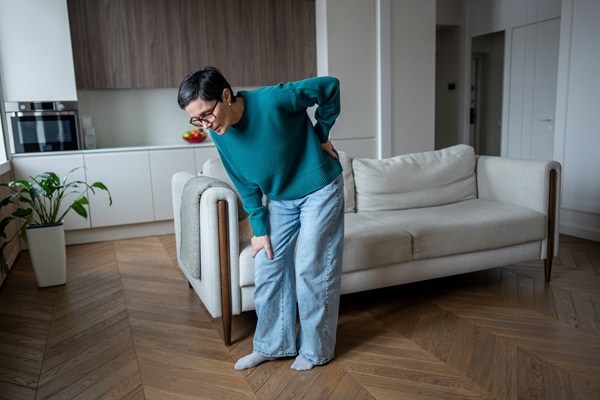Degenerative Joint DiseaseOoltewah, TN
Degenerative joint disease affects millions of people worldwide. It is the most common type of chronic arthritis. If left untreated, degenerative joint disease can become completely debilitating.
Degenerative joint disease treatment is available at Spine & Joint Regenerative Medicine in Ooltewah and the surrounding area. Manage your symptoms before they have the chance to get worse. Call us today at 423-424-1529 to schedule an appointment or learn more about our services.
Understanding Degenerative Joint Disease
Also known as degenerative disc disease, wear-and-tear arthritis, or osteoarthritis, degenerative joint disease is a condition in which the cartilage between the bones deteriorates over time. This causes the joints to become painful, swollen, and difficult to move. The condition typically attacks the hands, hips, knees, lower back, and neck, also affecting any joint.
While the symptoms of degenerative joint disease can usually be managed, the damage to the joints is irreversible. Patients can help slow the progression of the disease by staying active and maintaining a healthy weight. Some treatments can also help improve pain and joint function. The disease most often affects women in their 50s with symptoms getting worse over time, as it is a progressive condition. However, adults of any age and gender can be affected.
Symptoms of Degenerative Joint Disease
Since degenerative joint disease is a progressive condition, symptoms set in gradually and get worse over time. Most people experience the following:
- Clicking or cracking sound when bending the affected joint
- Joint instability or buckling
- Limited range of motion in the affected joint
- Muscle weakness around the affected joint
- Stiffness of the affected joint, especially first thing in the morning or after resting
- Pain or aches in the affected joint during activity, especially at the end of the day or after extended periods of activity
- Swelling around the affected joint
Patients with degenerative joint disease in the hips typically feel pain in the groin area or the buttocks, with occasional pain on the inside of the knee or thigh. Patients with degenerative joint disease in the knee may experience a "grating" or "scraping" feeling in the knee during movement. Degenerative joint disease may also develop bone spurs at the edge of the joints, causing fingers to become tender, red, and swollen. In addition, toes or ankles may become swollen, and the big toe may develop pain and tenderness.
Causes of Degenerative Joint Disease
There are two types of degenerative joint disease: primary degenerative joint disease and secondary degenerative joint disease. As mentioned earlier, primary degenerative joint disease is caused by a breakdown of cartilage between the bones. For this reason, it is particularly common in older patients. Wear and tear of the joints will naturally damage the cartilage, causing pain and swelling.
Secondary degenerative joint disease occurs when the cartilage is damaged by another medical condition or disease. These typically include:
- Body mechanics
- Congenital abnormalities
- Diabetes
- Gout
- Injury or surgery to the joint
- Menopause
- Obesity
- Repetitive movements
- Rheumatoid arthritis
Diagnosing Degenerative Joint Disease
As mentioned earlier, degenerative joint disease is a progressive disorder — meaning symptoms are slow to set in. As a result, it is often hard to diagnose until it begins causing painful symptoms or starts impeding one's daily activities. According to Healthline, early degenerative joint disease is often diagnosed when the patient requires X-rays for another condition — typically after an accident or another incident that causes fractures.
More complex situations may also require a magnetic resonance imaging (MRI) scan. MRI scans create images of bone and soft tissue using radio waves and a magnetic field. Dr. Lewis may also use other diagnostic tests to exclude any other possible conditions. This includes joint fluid analysis and arthroscopy.
Treating Degenerative Joint Disease
Patients with degenerative joint disease have several surgical and non-surgical treatment options available. Mild symptoms are often manageable with over-the-counter painkillers, such as non-steroidal anti-inflammatory drugs (NSAIDs), or acetaminophen.
However, as symptoms progress, some chiropractic care may also become necessary. In such cases, Dr. Lewis can help manually shift the bones and adjust them into place. Many patients also find that hyaluronic acid injection treatment can provide some pain relief. This type of therapy involves an injection of hyaluronic acid into the knee to provide extra cushioning between the bones.
Call Us Today
Is your degenerative joint disease pain interfering with your everyday life? We at Spine & Joint Regenerative Medicine can help. Call us today at 423-424-1529 to schedule an appointment or learn more about our services.
Frequently Asked Questions
How can obesity cause degenerative joint disease?
Any excess weight will place excess pressure on the joints. This is especially true for weight-bearing joints like the hips and knees. According to the Centers for Disease Control and Prevention (CDC), persons with arthritis can reduce pain and improve function just by losing 10 to 12 pounds.
How can I know if I have degenerative joint disease?
Some of the first signs of degenerative joint disease include finding yourself complaining of pain related to activity or pain when asleep or resting. You may also find yourself experiencing joint stiffness and deformity, especially joint stiffness and deformity that limits your joint function or negatively impacts your quality of life.
Can you cure my degenerative joint disease?
As of yet, there is no cure for degenerative joint disease. Treatment for degenerative joint disease centers on managing the symptoms. Our team will combine different treatment modalities to bring about the best results for you and your unique lifestyle.
What foods should I eat if I have degenerative joint disease?
If you have degenerative joint disease, it is important to avoid any foods that may promote inflammation in the body. You should also focus on reducing your cholesterol and maintaining a healthy weight. Eating a balanced diet of calcium- and vitamin-D-rich foods can help.
What is arthritis?
Arthritis is a group of over 100 disorders that affect the joints or the tissues around the joint. Patients of any age and gender can be affected by arthritis. While degenerative joint disease is the most common form of chronic arthritis, rheumatoid arthritis (RA) is the most common form of inflammatory arthritis. Inflammatory arthritis is a type of arthritis that is caused by an overactive immune system.
Check out what others are saying about our Degenerative Joint Disease services on Yelp: Degenerative Joint Disease Ooltewah
Contact Us
Spine & Joint Regenerative Medicine is located at 6711 Mountain View Road #115 B Ooltewah, TN 37363.





